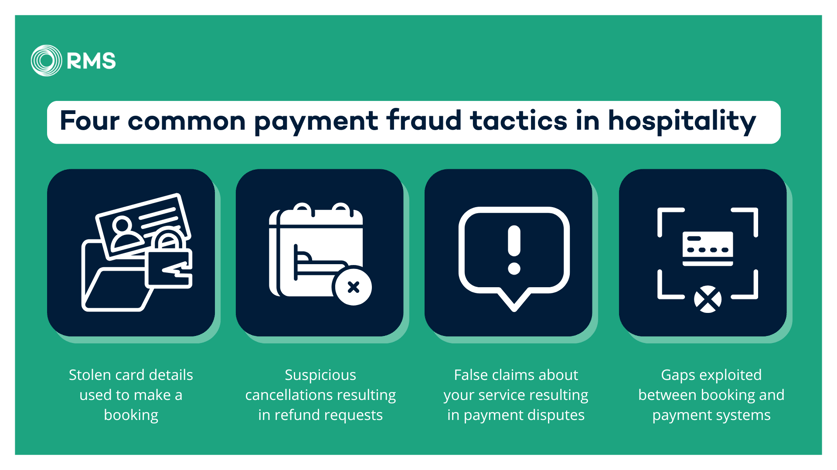How to spot and stop payment fraud in hospitality
Fraudsters are getting more sophisticated, and our beloved hospitality industry is a prime target. Whether you’re running a hotel, motel, holiday park or group of properties, fraud can eat into your revenue, damage guest trust, and create unnecessary stress for you and your staff.
But equally, fraud prevention software is improving too, and with the right tools and a little know-how, you can reduce your risk significantly. Let’s unpack what you can do to stop fraud in its tracks.
Firstly, what is payment fraud?
At its core, payment fraud is any transaction made without the cardholder’s authorisation. That can include stolen card details, chargeback abuse, account takeovers, or fake bookings. In the hospitality world, fraudsters often rely on anonymity, especially when bookings are made online or via third-party channels.
They might:
- Use stolen card details to book a room at your hotel or site at your park
- Cancel a legitimate booking and request the refund to a different card
- Claim a service wasn’t delivered and initiate a dispute after their stay
- Try to exploit gaps between your booking system and payment provider
What does that look like in action? Here are four types of payment fraud to watch for:
- Card testing
A fraudster might use your booking engine to test if a stolen card works. They usually start with small transactions first, like a single night’s stay at your cheapest site. If it goes through, they may come back with bigger charges, like adding more nights and upgrading the booking.
- No-show scams
A fraudster might book a high-value stay, like the top suite in your hotel, not show up, and later dispute the charge, claiming they never authorised it.
- Refund redirection
Someone might call to cancel a booking and ask for a refund, but request to be refunded to a different card or account. If your staff don’t check carefully, they could be refunding a scammer.
- Friendly fraud
Hard to spot. A genuine guest could dispute a charge after their stay, saying they didn’t receive the service or didn’t authorise the payment, even if they did. This could happen if their booking passes through multiple touchpoints, like your website, an OTA and additional purchases at your property.

Why are hospitality businesses a target?
Let’s face it, on any given day at your property there’s a lot going on, and it makes you vulnerable for a few reasons:
- High transaction volumes, often with fast turnaround times
- Remote transactions (guests aren’t always present during payment)
- Multiple booking channels, including OTAs and call centres
- Inconsistent fraud checks between systems or staff
Fraudsters know they can slip under the radar, especially during busy seasons when your team is laser-focused on guests.
How can you protect your business?
There’s no silver bullet, but here are a few smart ways to reduce your risk.
1. Use an embedded payment solution built for hospitality
Choose a provider that embeds with your property management system’s UX (like RMS Pay), so you can see everything in one place, automate your workflows, reduce admin and reliance on third parties, and catch inconsistencies early.
2. Take control in a dispute
Find a payment system that gives you greater control over your security measures, like the ability to monitor and defend disputes, or pre-authorize an account prior to arrival.
- Understand security compliance
Having a good understanding of PCI DSS compliance and using a compliant payment system will help to improve security around your transactions.
4. Train your team
Front desk and reservations staff should know what fraud looks like. A simple checklist or playbook can help, especially for refund requests and suspicious cancellations.
5. Keep everything connected
Fraud often slips through when systems aren’t talking to each other. A fully integrated tech stack - PMS, payments, channel manager, booking engine - makes it easier to spot unusual behaviour early.
6. Communicate with guests
To avoid friendly fraud, communicate early and often with your guests about their reservation and related payments, particularly if they’re not booking directly through your website.
7. Develop best practice
Every business is different, and so are your guests. Build best practices into your guest workflows and automate repetitive tasks prone to human error (like reconciliation) as much as possible.

Fraud is not inevitable
While fraud can be frustrating, it’s far from inevitable. By tightening up your systems, training your team, and choosing the right payment tools, you can significantly cut your risk.
With fewer dodgy transactions to worry about, you can stay focused on growing your business and providing a great experience for your guests.
If you're using RMS Pay, you’re already a step ahead. Our embedded payment solution gives you the tools to mitigate fraud without adding complexity to your day.


